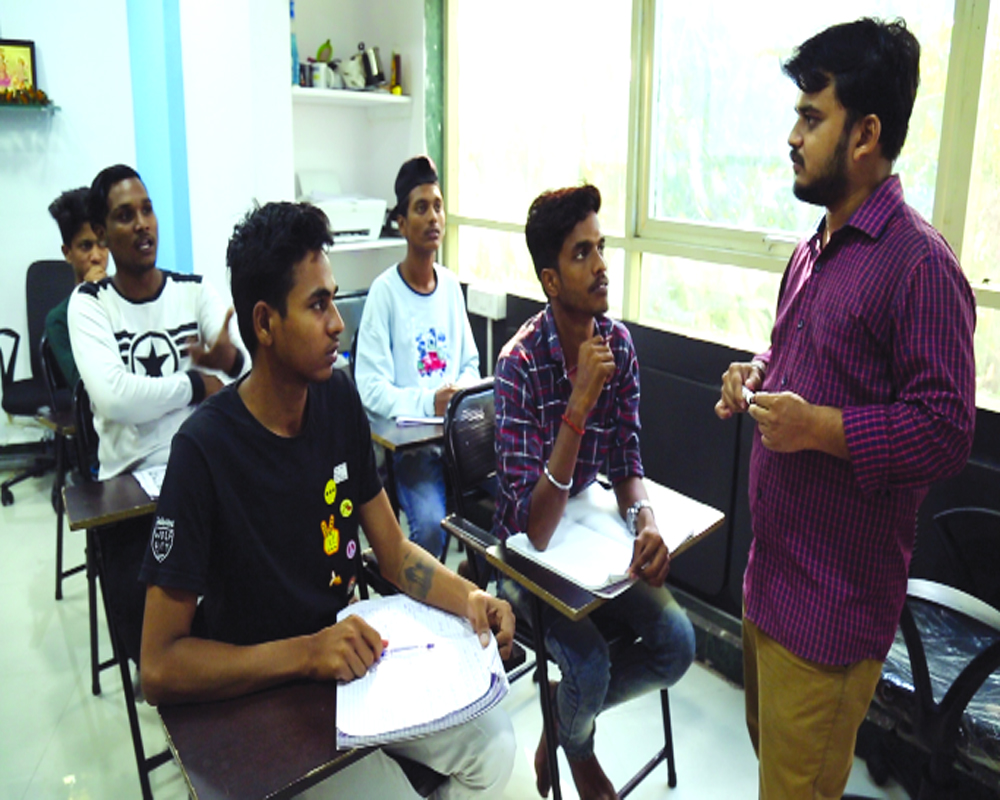Sanish Kulkarni’s attempt to educate and empower underprivileged youth by providing them with livelihood options has impacted close to 500 youngsters, says Mithila Naik-Satam
Sanish Kulkarni called me to his digital centre at Thane without giving me the context of where we were off to for the day. He called it ‘on-field’. Full disclosure and fieldwork have always been up my alley, so I gladly agreed.
We hopped into a rickshaw and Kulkarni disclosed that we were headed to Kalyan, Vittal Wadi — approximately an hour’s ride from Thane. En route, he gave me the background of why Guddu’s (name changed) tale is one of his rewarding success stories. Guddu was one of Kulkarni’s early students and a part of the digital skill training programme. Speaking of him, Kulkarni beamed with pride. “He would spend a lot of time looking at music videos on YouTube. Our team picked up his organic inclination towards the visual medium and taught him editing. Six months into training, he edited his first rap music video and it is now up on YouTube,” informed Kulkarni proudly.
Guddu learned these skills at the 12-month training course that Kulkarni designed. “We started with tech training and soon realised that we needed to include mental health sessions and workshops too. Since our course also includes editing, we added movie screenings for the kids to watch from and learn,” explained Kulkarni.
A gold medalist Tata Institute of Social Sciences (TISS) alumnus, Kulkarni along with a handful of like-minded fellow graduates, formed Advocating Youth At-risk through Nurturing and Support Hub (AYANSH) Foundation, an action plan to educate and empower underprivileged youth, providing them with various livelihood options.
Without a doubt, this is one of the most pressing problems in our country given that every third person in an Indian city today is a youth. According to a report, by 2020, India’s population was expected to become the world’s youngest; more than 500 million Indian citizens would be under 25 years of age, and more than two-thirds of the population were eligible to work. This implies that a growing number of India’s youth need the right educational infrastructure to develop skills and adequate opportunities to get employed or become entrepreneurs.
Since the early days, Kulkarni wanted to support youth who were deprived of privilege. While asking what pushed him in this direction, he said, “You notice the stark difference; we have the privilege. These kids, who come from marginalised backgrounds, don’t. Simply put, the idea was to create an equitable society where all the youth-at-risk are enabled with work-oriented education and training that prepares them for jobs, self-employment or even entrepreneurship.”
AYANSH’s skill-based training model stemmed from Kulkarni’s strong determination to uplift the underprivileged youth and create a livelihood path for them.
“Before starting AYANSH, my team and I were engaged in an initiative to train youth in different skills like painting, carpentry, housekeeping. However, after spending enough time with the students, we noticed, they often signed up for the courses to get into good books but were not keen to pursue them. After repeated conversations with youngsters based in Mumbai, Thane and Pune, we affirmed that these youngsters are aspirational and more inclined to study courses related to new software technologies,” narrated Kulkarni as we walked the narrow lanes of Vittal Wadi.
As I tried to understand what drove Kulkarni to take this initiative, he revealed that his academic background in Mass Communication made him decide to train students in graphic designing, video editing, and other digital software. “This led to us opening our first digital training centre in Thane in July 2018,” said Kulkarni.
As far as curriculum is concerned, it is designed according to the needs of the industry so that students get hands-on experience before joining a company. They also ensure to provide basic training to the students who have had zero exposure to computers or the internet before starting the software training.
Along with skilling, they understood the importance of gearing up youngsters to speak and read the English language. “We extended our teachings to train them in the English language during the digital course, this helped students gain confidence while coaching them for job interviews,” informed Kulkarni.
Speaking of the support systems he gives due credit to Pravah, a non-profit body, his research guides at TISS — Sasmita Swain and Dr Sri Krishna Sudheer Patoju — and his coach Roshan D’souza at UnLtd India who supported his venture strongly and believed in the idea.
AYANSH’s first batch had six students from a variety of backgrounds. And Guddu was one of them. Today, AYANSH has impacted close to 500 youngsters. Kulkarni likes to believe that the foundation and his work are more like a movement with vibrant individuals leading and helping it move forward. “We will continue to bridge the gap between the underprivileged and the opportunities by developing students’ creativity. I want to help build a ripple effect where Guddu soon becomes a guide to a younger Guddu who probably needs to be nudged in the right direction,” Kulkarni adds.
As this on-field day came to an end, Kulkarni smiled widely and quoted, “We cannot always build the future for our youth, but we can build our youth for the future.”
(The author is a development worker and a writer from Maharashtra.)


























